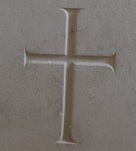
"The Festival of Unleavened Bread to the Lord is on the fifteenth day of the same month. For seven days you must eat unleavened bread. On the first day you are to hold a sacred assembly; you are not to do any daily work." (Leviticus 23:6-7)
Today I want to look at two things. First, as we see above the 15th of the month of Nisan, the day after the Passover, was to be treated as a special day, in which no work was to be done. This would have been referred to as a High Sabbath, or Special Sabbath depending on your translation. We saw yesterday in our reading, in John 19:31, that John said the bodies on the cross should not be left there during the Sabbath. John notes that this Sabbath was a high, or special, day.
Many people assume, as do some translations, that because Jesus needed to be taken off the cross before the Sabbath, that the crucifixion had to have taken place on Friday, the day before the weekly Sabbath. However, when you study the Passover and the Feast of Unleavened Bread, you see that the day after Passover was always a Sabbath, regardless of the day of the week. It was a High Sabbath. Each year, this High Sabbath fell on a different day of the week. Much the way, our 4th of July celebration falls on a different day each year. While it is possible that Jesus was crucified on Friday as tradition holds, what is known for certain is that Jesus would have been placed in the tomb by 6:00 p.m. at the end of the 14th of Nisan to avoid this High Sabbath. As I've said before, the day of the week isn't important. The fact that Jesus was the perfect Passover sacrifice, that is what is important.
The second thing I wanted to look at today is the significance of the celebration of the Feast of Unleavened Bread. We saw in today’s reading that this celebration was in recognition of God delivering Israel from slavery in Egypt. This was the first day the Israelites were free from slavery to the Egyptians. Likewise, the 15th of Nisan was also the first day after Jesus’ death on the cross. Therefore, for a world in bondage to sin and death, it was the first day of freedom from this slavery.
It is important to remember however, that God did not immediately bring the Israelites into the Promised Land. He first led them into the wilderness. This time provided a period of testing and trials for the nation. Often, the Israelites responded in disobedience and a desire to return to the slavery out of which they had been delivered. It wasn’t until this rebellion was removed from the nation that they were brought into the Promised Land. Likewise, God does not immediately deliver us from this world, but rather He uses our time here to sanctify and prepare us for eternity.
Questions for Reflection:
- Do you ever find yourself drawn back to the slavery of sin from which you have been delivered?
- Take some time to pray and ask God to forgive your impatience and unwillingness to live as the new creation he has made you.


 RSS Feed
RSS Feed